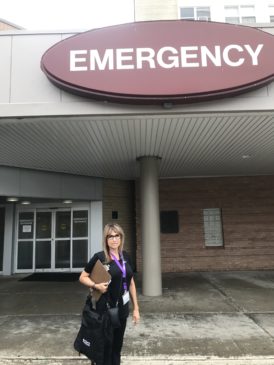
[slideshow_deploy id=’899′]
BY MICHAEL OLOHAN
OF NORTHERN VALLEY PRESS
NORTHERN VALLEY AREA,N.J.-You might call them “second-responders.” Some have called them their “angels.” The former addicts who show up at the hospital following an opioid overdose victim’s reversal are there to offer the victim a second chance at getting off drugs and making a new life.
They’re not always welcomed. In fact, sometimes the victim refuses to even speak with them. Often, they arrive at the hospital to find the victim sick, nauseated and having just vomited and ready to do so again. Basically, they are seeing human beings at the lowest point in their lives.
Sometimes, the victim refuses to let them visit. But at least half the time they do, and on a good week, it may be much better than that.
Since May 2017 in Bergen County, when an opioid overdose victim is “reversed” by the Narcan antidote by a first responder anywhere countywide and brought to any of the county’s five participating hospitals—a dispatcher at the county’s Public Safety Operations Center in Mahwah is notified and a call goes out to the Opioid Overdose Recovery Program, based in Fair Lawn.

Recovery specialists
The program calls on its rotating list of 15 recovery specialists—all former drug addicts—to head to the hospital and offer to speak with a reversed victim and make sure they’re aware of available resources and offer the victim a chance to get into a detoxification program and on the road to recovery.
For the last two years, Gloria Byrne of Closter, 58, has served as a recovery specialist and visited dozens of overdose victims, hoping to get them help and letting them know that they can beat back their addiction.
“I had a really good friend of mine lose her son Michael,” said Byrne of her motivation to become involved.
“That’s what started my journey,” Bryne said, “and it’s been over 50 cases I’ve had in the two years.”
She said though she is frequently rejected by overdose victims who refuse to talk to her, she always leaves her card—featuring St. Michael The Archangel—when possible to show “somebody cares about them.”
She said often when she visits “reversed” victims in the hospital, she rarely sees family present.
When she does see family members there, she said that gives the victim an even better chance of recovering.
“You can ultimately only help the ones that want it,” she told Northern Valley Press.
“I go to the hospitals to act almost as a beacon of hope for those who have just been revived. They’re often sick when I arrive, and I’m walking around vomit. If the family is there, I get to talk to them a little before I see the victim to learn something about the person inside, but most of the time there’s no family [present],” said Byrne.
Byrne said often the family and the hospital staff are especially glad to see her as they are often unsure of what more help is available to the individual in crisis.
“So when you go into the hospital not wearing a white coat, you’re hoping to gain their trust,” said Byrne.
She said for overdose victims who agree to enter detox, “we do a lot of follow-up on their cases,” she said, noting a minimum eight-week follow-up for addicts who agree to enter the program.
She said with help from program navigators, they are often able to place reversed victims into short-term detoxification programs and long-term counseling.
“When you go on a call and the family is there, they are just so relieved to see us because they don’t know what to do anymore. Often these [overdose victims] have been living on the streets, or were thrown out of the home…some families follow their kids on the streets and and they simply don’t know where to turn,” she said. “They refer to us as their ‘angels.’”
Using St. Michael the Archangel as her spiritual guide, she said she tells the overdose victims “we’re here to slay the devil [drug addiction]. I come to the victim’s bedside to give them hope, to give them an out, to help them. It’s really an unbelievable thing, we come to offer a glimpse of hope…and every case is different; no case is like any other case.”
She said the position is unlike any job she has ever had and its rewards provide inspiration to victims and herself.
‘All we can do…’
“Sometimes when I see these people at their lowest…sometimes they have a moment of clarity. It may be a point when you can really gain their trust. It just takes that one right word to reach somebody. All we can do is plant a seed. I think I’ve touched every person in some ways. Another person relapsed and just called me today…I planted a seed there,” she said.
“If I can plant a seed, hopefully they learn how to water it. I try to talk to people, addicts, homeless and give them some inspiration,” Byrne said.
She said every month the recovery specialists themselves meet with a psychologist to share their stories and get support for their mentally and emotionally demanding work.
Byrne said over the years she volunteered with the Hills-Valley Coalition before becoming involved with the Northern Valley Coalition and the opioid overdose recovery program.
“We cannot be there 24/7 with them but it’s almost like it needs to be a calling of sorts,” she said.
Byrne shared her experience as a recovery specialist on the front lines of the opioid crisis.
Bergen’s OORP program
In 2017, the Center for Alcohol and Drug Resources in Fair Lawn was awarded a contract from the state Human Services department, division of mental health and addiction services, to develop the Opioid Overdose Recovery Program in Bergen County.
Its purpose is to provide one-on-one assistance in emergency rooms to get “reversed” overdosed individuals to enter long-term treatment and recovery.
From January through July 2018, Bergen County recovery specialists were notified 315 times of reversed opioid overdose victims by police, EMTs, or family/friends of victims, said Ellen Elias, Bergen County’s OORP program manager and senior vice president of prevention and community services at center.
Of those 315 notifications, 57 percent of the time the reversed overdose individual agreed to speak with a recovery specialist, and of those who agreed to speak to a counselor, about 50 percent agreed to enter treatment, equating to about 90 individuals entering counseling, detoxification and/or long-term treatment this year.
‘Strong collaboration’
“The most profound outcome of this [program] is that now in our county there is a strong collaboration between health care, law enforcement, and mental health treatment services, and our agency and the recovery specialists,” Elias told Northern Valley Press in August.
Every county hospital participates in the program including New Bridge Medical Center (formerly Bergen Regional), Hackensack University Medical Center, Englewood Hospital and Medical Center, The Valley Hospital, and Holy Name Medical Center, and all use the same protocol for treatment.
For information on OORP, visit http://www.tcadr.org, email Elias at eelias@cafsnj.org or call (201) 261-2800.
